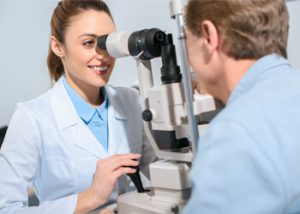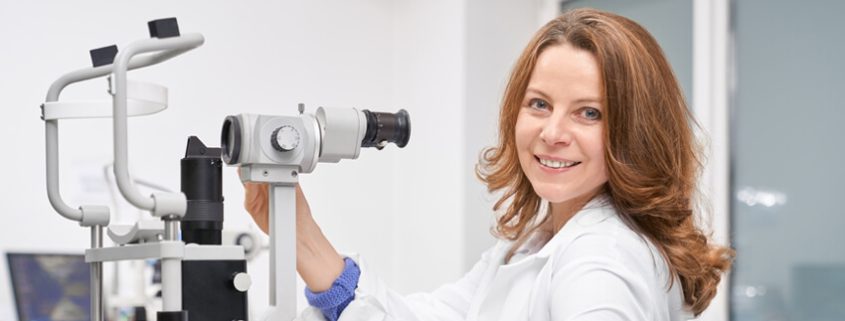Symptoms of Macular Degeneration — Everything You Need to Know
Around 1.4 million Australians are thought to have some stage of age-related macular degeneration. This equates to 1 in 7 adults over 50 years old. Detecting and diagnosing macular degeneration is done through an eye care professional with the appropriate equipment; this can either be your local optometrist or a specialist eye doctor. Everyone, especially older adults, should keep up with routine eye tests. As the symptoms of macular degeneration start off very subtly, the best way to diagnose it early is through attending regular checkups with your optometrist or eye doctor.
What is Age-Related Macular Degeneration?
As the name suggests, age-related macular degeneration is more likely with older age. However, although it is associated with age, it is not considered to be a normal part of ageing. The macula is an anatomical part of the retina in the eye and is responsible for your central vision. It is also involved in the discrimination of fine detail and colour perception. Degeneration refers to damage and deterioration of the cells making up the macula region, which results in the typical symptoms of macular degeneration.
Age-related macular degeneration involves gradual, progressive, painless loss of your central sight. Eye doctors don’t fully understand why it happens or what causes it, but we do know there are some factors that increase your risk of developing macular degeneration. These include:
- A family history of age-related macular degeneration. Having a biologically related parent or sibling can increase your risk of macular degeneration by 50%.
- Smoking. Being a smoker increases your risk of developing age-related macular degeneration by up to 4 times.
- Older age. Being over the age of 60 is considered a significant risk factor.
- Ethnicity. Caucasians appear to be more at risk compared to other races.
- Other systemic diseases. Obesity and cardiovascular disease have both been linked to age-related macular degeneration.
The Symptoms of Macular Degeneration
The symptoms of macular degeneration in its early stages are subtle. In fact, your eye doctor may notice you have some early or even intermediate signs before you even realise there are any changes to your sight. This is why regular eye tests are important.
If you do have age-related macular degeneration, you may begin to notice some symptoms such as:
- Distortion to your vision. Straight lines and edges may start to appear bowed or wriggly. For example, the frame of your mirror may no longer look straight and parallel, or road markings that should be straight, appear to have a little blip in them.
- Increasing difficulty in discerning fine detail, such as during reading. This can persist even when wearing your glasses or contact lenses.
- Dark or blurry patches in the centre of your sight.
- In rare cases, you may be aware of a change in your colour perception.
Because the disease affects your central vision only and leaves your peripheral vision intact, most people are still able to move around independently.
 Most cases of age-related macular degeneration are of a type known as dry macular degeneration. This is as opposed to the wet form, which involves the development of new, fragile blood vessels under the macula. In wet macular degeneration, also known as neovascular macular degeneration, these retinal blood vessels can leak blood and fluid, which damages the nearby retinal cells.
Most cases of age-related macular degeneration are of a type known as dry macular degeneration. This is as opposed to the wet form, which involves the development of new, fragile blood vessels under the macula. In wet macular degeneration, also known as neovascular macular degeneration, these retinal blood vessels can leak blood and fluid, which damages the nearby retinal cells.
While dry macular degeneration typically results in quite a slow progression of vision changes, wet macular degeneration can cause sudden and abrupt losses of central sight. If there is a large haemorrhage, you may notice quite a big area of your visual field is blurred or darkened, more expansive beyond what you would consider your central vision.
Can Age-Related Macular Degeneration Be Treated?
At this point in time, there is no cure for age-related macular degeneration. However, there are treatments in the form of eye injections (known as intravitreal VEGF injections) that can slow or stop the progression of wet macular degeneration. Some studies have even found patients undergoing these injections may regain some limited sight. There are also other treatment options for the wet form of the disease, such as laser therapy to destroy and seal off the abnormal new blood vessels.
For the dry form of the disease, there is no known treatment. This being said, research has shown that certain lifestyle modifications and nutritional supplements can help to reduce your risk of macular degeneration or delay the progression of the dry form. Your eye doctor can help you to identify what steps you can take to improve your macular health. These can include:
- Quitting smoking
- Getting other medical conditions under control, such as managing your cardiovascular health or obesity
- Eating a diet high in antioxidants, such as green leafy vegetables or red, orange, and yellow fruit and veg
- Incorporating healthy levels of omega-3 into your diet. These can include food sources such as oily fish or certain nuts
A nutritional formulation known as the AREDS2 formula has been demonstrated by research to reduce the likelihood of dry age-related macular degeneration progression. This has only been shown to be beneficial for certain stages of the disease, though, so check with your eye care professional about whether it’s worth taking them for yourself.
There is ongoing research into finding a cure or more effective treatments for age-related macular degeneration in both its dry and wet forms. In the meantime, be sure to maintain regular eye tests with your eye care professional, particularly if you have any of the risk factors for macular disease.
Call us on (03) 9070 3580 today.
References
Age-related Macular Degeneration.
https://www.mdfoundation.com.au/about-macular-disease/age-related-macular-degeneration/AMD-overview/
Symptoms of Age-Related Macular Degeneration.
https://www.webmd.com/eye-health/macular-degeneration/age-related-macular-degeneration-symptoms
Dry macular degeneration.
https://www.mayoclinic.org/diseases-conditions/dry-macular-degeneration/symptoms-causes/syc-20350375






Leave a Reply
Want to join the discussion?Feel free to contribute!